1
/
of
1
Cranclense
Cranclense 20 Effervescent Tabs
Cranclense 20 Effervescent Tabs
Regular price
$17.99 NZD
Regular price
Sale price
$17.99 NZD
Unit price
/
per
Tax included.
Shipping calculated at checkout.
Couldn't load pickup availability
Customer Declaration: I agree to use strictly as directed and if symptoms persist or if I suffer any adverse effects, I will contact my Doctor or Pharmacist. This is a "Pharmacy Medicine". By ordering this product I acknowledge that I have read and understand the information regarding the product.
Cystitis occurs when the bladder becomes inflamed. Cystitis usually occurs as a result of a common form of infection. Certain bacteria naturally live in the large intestine including a bacterium called E.coli (Escherichia coli).
Most of the time, our body keeps E.coli in check and it is not a problem. However, sometimes, E.coli may cause infections by attaching to the cells of the bladder, resulting in a bladder infection and inflammation.
Cystitis makes passing urine very painful. Urination is usually more frequent with a feeling of greater urgency. Sleep may also be disturbed due to the pain and discomfort, and working life may be disrupted.
Cystitis generally most commonly affects women, but may affect all age groups from either sex.
How does Cranclense work?
E.coli bacteria make chemicals that enable them to cling on to the cells in the bladder where they can replicate and cause infection. Cranclense contains cranberry that can prevent bacteria such as E.coli sticking to the cells of the urinary tract lining. As the bacteria are unable to attach and adhere to the bladder cells, the bacteria are passed out while urinating, and cystitis is then less likely to develop.
WHO IS AT RISK OF CYSTITIS AND MAY NEED CRANCLENSE?
Females generally have a greater risk of cystitis than males, especially in the following situations:
- Increased frequency of sexual intercourse
- Diaphragm use
- Post-menopausal.
- People with incorrect, compromised or poor toilet hygiene such as people with dementia or young girls.
- People who fail to empty their bladder properly due to various conditions such as kidney or bladder stones or, for males, an enlarged prostate.
- People with diabetes.
- The elderly.
- People who have an altered immune system.
- People with a childhood history of cystitis.
- People with an abnormally structured bladder.
- People who have a urinary catheter in place or after its removal.
Share


